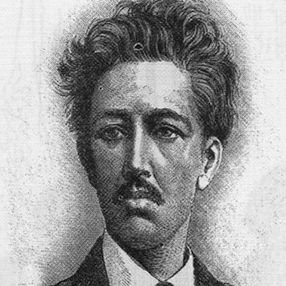The Fifth of May
translated from the Spanish by Ernest S. Green and Miss H. Von Lowenfels
I
There were three, but England
Again launched herself into the waves,
And the Spanish vessels
Sailed again to this land.
Only France exclaimed : “Let there be war !”
Dreaming, O, my fatherland of conquering thee ;
And in her advantage, making use
Of infamy and fortune,
She rose at once to establish
The right of the stronger.
II
Seeing not that in such a sanguinary conflict
Thy arm was weaker,
The dispute embodied in its obligation
The redemption of thy affront
The flames of their cannons
Broke forth in a yellow light,
And the world beheld thy legions
Entering the fierce combat,
Only carrying for a shield
The shield of their hearts.
III
And then it was when, at the cry
Uttered by thy boldness,
France trembled with fear
Understanding her transgression ;
And when at thy unbounded voice
Were heard the words, “be it thus !”
And when seeing the terrible
And desperate conflict,
In thy hand arose the sword
And in thy conscience the design.
IV
Since in the orient shone
The light of that eternal sun
Whose pure and delicate ray
Approaches to kiss thy brow,
Thy independent banner
Floated on the mountains
While the hostile armies
Raised their flag in anger
Which was waving haughtily
With the splendor of their exploits.
V
And the hour arrived, and the sky.
Clouded and darkened,
Disappeared, concealed
As in the folds of a curtain.
Death spread his wings
Over the frightened land,
And between the terrified Frenchman
And the furious Mexican,
Arose the mighty war-cry
Shaking the earth.
VI
And there the Frenchman, the first
Of the soldiers of the world ;
He who in his glories absorbs
Those of the whole world,
Was three times forced to run,
Pale and fierce,
Before the intrepid populace
Who, to save thy name,
Gave thee a soldier in every man
And a hero in every soldier.
VII
Three times ! and when France
Felt her war fame ruined,
And gazed upon her banner,
Stained and gory,
She saw the illusions
Of her victory lost,
And in spite of her strife,
And in spite of her eagerness,
She saw glory dawning
In another heaven and in another world.
VIII
That which, in the unsteady mist
That floated over the country,
And in the vapor which rose
Beneath the path of the breeze,
Was for thy innocent heart
Its most beautiful smile ;
Its most eloquent song
To sing on thy journey,
And its most beautiful crown
To place on thy brow.
IX
Yes, fatherland, since that day
To the world thou art no more
What Europe, in her profound
Disdain supposed.
Since then, my native land,
Thou hast entered a new era,
The noble and lasting era
Of fame and progress
Which descends to-day, like a kiss
Of love, upon thy standard.
X
Over that blessed banner
Which to-day the people,
Who in turn are stirred in their affections,
Come to cover with flowers,
And who, in the boundless happiness
With which they plant it in the soil,
Swear to thee, gallant and brave,
As once before the Frenchman,
Sooner than see thee a slave,
My native land, for thee I die.
1873.
From Mexican and South American Poems (Spanish and English) (Dodge & Burbeck, Booksellers and Stationers, 1892), translated by Ernest S. Green and Miss H. Von Lowenfels. This poem is in the public domain.

